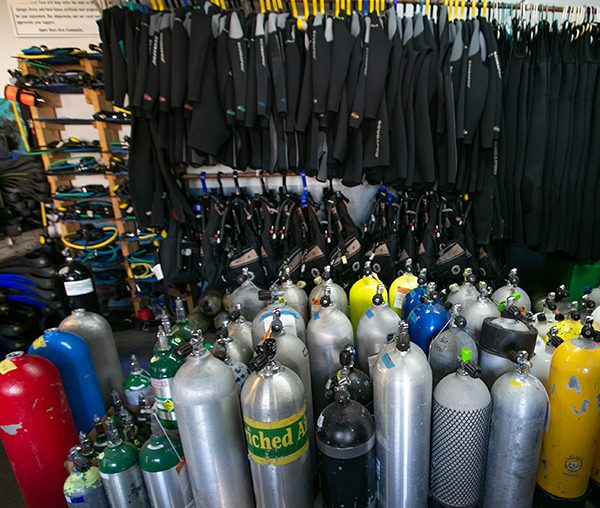RENTAL
EQUIPMENT

SCUBA RENTAL EQUIPMENT can be important for business because it attracts customers who might not otherwise be participating in scuba activities. This includes not only certified divers who do not own complete scuba setups but also those who would like to give scuba a try for the first time. Proper storage of this equipment is important to keep it functioning correctly and to avoid spreading diseases among staff and customers. Here are some key points to consider when assessing your equipment rental room.
ASSESS CONDITIONS OF
THE RENTAL EQUIPMENT ROOM
In addition to obvious considerations such as cleanliness and organization, there are other, equally important aspects that may go underappreciated. Poor lighting represents a safety risk (staff could trip or drop items), and it may also impair staff members’ ability to detect deteriorating equipment or other risks such as fungal contamination before assigning equipment to a client. Humid and/or poorly ventilated environments can encourage bacteria and mold to grow on rental equipment, and temperature extremes can lead to deterioration of equipment and even gear failures.
When considering staff safety, it is important that the rental equipment room have fall-prevention procedures such as securing heavy items to the wall to prevent injury to staff. This is especially important if customers are allowed to enter the area.
SCHEDULE
REGULAR INSPECTIONS
Quick postdive inspections of rental equipment are a great way to ensure that quality and high standards are maintained. Customers may not always notify you of issues with rental equipment, so it is always a good idea to ask if everything was working as it should, and any issues should be noted and fixed before renting the equipment again. Be sure to record the issue, who fixed it, and the outcome since failure to address such concerns could result in legal liability.
In addition, regular inspection and testing of all rental equipment can help identify these issues so that customers are not given faulty equipment. Be sure to record the results of these tests, and repair any broken or damaged equipment before adding it back into circulation.
INFECTION
CONTROL PROCEDURES
It is not always possible to know if customers have communicable diseases, so having infection control policies and procedures in place for rental equipment will help stop the spread of disease.
Pieces of equipment that come in contact with mucous membranes are more likely to transmit diseases. This includes masks, snorkels, second stage regulators, and BCD oral inflators. Dive operators should ensure that these pieces of equipment are adequately cleaned between users. Be sure to use a disinfectant that is safe for use on scuba equipment and will work against any specific pathogens known to be in your area.
FIRE SAFETY
Rental equipment usually requires a large investment, so ensuring that these items are protected in case of fire is always a good idea. Fires can spread rapidly in confined areas and can cause injuries or death if a person is caught without escape.
A fire safety plan may include: an analysis of any fire risks; firefighting procedures; an assessment of fire extinguisher locations, intended use, and inspection schedules; and exit routes. You should also consider installing fire detectors in areas that may be at higher risk of fire, establishing a no-smoking policy, and posting signage to alert staff and the public of fire risks.
DAN Customer Service
Mon–Fri, 8:30 a.m. – 5 p.m. ET
+1 (919) 684-2948
+1 (800) 446-2671
Fax: +1 (919) 490-6630
Email: Member@DAN.org
24/7 Emergency Hotline
In event of a dive accident or injury, call local EMS first, then call DAN.
24/7 Emergency Hotline:
+1 (919) 684-9111
(Collect calls accepted)
DAN must arrange transportation for covered emergency medical evacuation fees to be paid.
Medical Information Line
Get answers to your nonemergency health and diving questions.
Mon–Fri, 8:30 a.m. – 5 p.m. ET
+1 (919) 684-2948, Option 4
Online: Ask A Medic
(Allow 24-48 hours for a response.)
